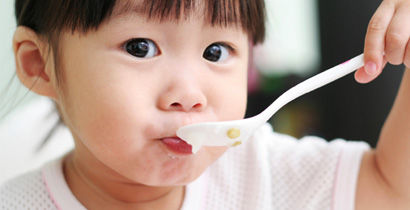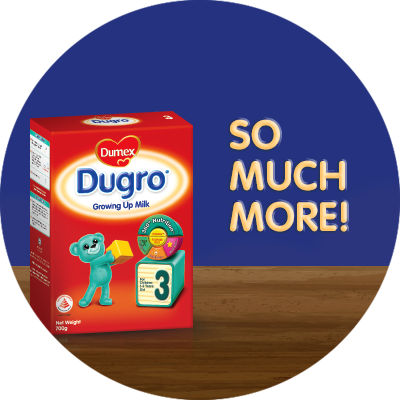Breastfeeding is the best for babies and a healthy diet / maternal nutrition is important when breastfeeding. A decision not to breastfeed can be difficult to reverse. Infant formula is suitable from birth when babies are not breastfed. It is recommended that all formula milks be used on the advice of a doctor, midwife, health visitor, public health nurse, dietitian, pharmacist, or other professional responsible for maternal and child care and the financial implications should be considered. All preparation and feeding instructions should be followed carefully as inappropriate preparation could lead to health hazards.
Toddler's Development - Dumex Mamil® Gold
As your baby advances from baby to toddler, this is a period of intense physical and mental development, as your toddler’s brain gets ready for the challenge of more developed walking and talking. So to ensure their growth and development are on track, a balanced diet is essential to provide them with the nutrients they need. Why your toddler’s diet is different to yours A balanced diet for a toddler is very different from ours. Their nutritional needs differ, and these differences need to be taken account of when planning your toddler’s meals: Sugar and salt - Toddlers should actually have no more than 1/6th of an adult's maximum daily allowance of salt in any one day, which is less than 1g per day. That’s why it’s so important not to add salt to any baby food you prepare yourself. Some adult foods are not suitable for toddlers because they’re too high in salt or sugar, or contain artificial colourings and flavourings. Portion sizes - Your toddler's tummy is also at least 5 times smaller than yours. That's why they need to eat small amounts of energy and nutrient rich foods frequently throughout the day. To get the right balance of energy and nutrients, your toddler tends to need three small balanced meals a day with regular nutritious snacks in-between. Energy and nutrient needs - Toddlers are not mini-adults, they need a diet relatively high in fat and low in fibre. Although fibre is a good thing, it's very filling and so too much of it may not provide your toddler with enough of the energy and nutrients they need. Different foods have different nutrients so ensuring your toddler eats a wide variety of food is important to give them a balanced diet, as well as for their healthy growth and development. Milk – Milk is still a vital part of your toddler’s diet, providing fat, energy, protein, vitamins and minerals such as calcium, and they’ll need about 350ml / 12oz a day. Growing Up Milk Formula such as Dumex Mamil Gold PreciNutri Step 3 is nutritionally superior to cow's milk as they are enriched with Vitamin D and Iron. It is suitable from 12 months to 3 years and helps to complement your toddler's diet. So what is a 'balanced' diet? A balanced diet is made up of a combination of the following: CarbohydratesSuch as: Bread, cereals and potatoes.Whilst wholegrain cereals and bread are better, you should offer your toddler a mixture of both.Carbohydrates can be served at every meal and can be offered as a snack too. Fruit and vegetablesSuch as: carrots, bananas and tomatoes.Try and offer a range of different coloured fruit and vegetables as they all contain different nutrients.Aim for five servings per day, but remember a toddler's serving is smaller than aldult's. Dairy Such as: milk, cheese and yogurt.Milk should be part of your toddler's diet every day but be sure to include other calcium rich dairy food too.You toddler should be having three portions of dairy food per day which can include snacks. Protein Such as: meat, fish, eggs and pulses.This food group provides your baby with essential iron and omega-3 fats.Serve twice a day. vegetarians should have three servings and team it with a food or drink high in Vitamin C to help absorb the iron. Fat and sugar Such as: oils, butter, cakes, and biscuits.Some oils can provide Omega 3 and 6 fats.You should include these in your toddler's diet, but make sure that this is an extra and do not use to replace one of the other food groups.Foods to avoid Some foods need extra attention when preparing them, whereas others are best avoided, full stop.Salt should be avoided; keep it to a minimum when cooking and instead use herbs and spices to season. Remember to check the salt content in pre-prepared food, too.Additives and sweeteners, like those found in drinks and sweets, should be avoided.Eggs and shellfish can affect delicate tummies and even cause food poisoning if not cooked properly, so always make sure they're well cooked.Although there’s nothing bad in nuts, some children are allergic and can have severe reactions. Even if your toddler isn't allergic to nuts, they can be a chocking hazard so it’s best to steer clear. Disclaimer: All content on this Website is provided solely for informational purposes and is not intended as a substitute for medical and/or other professional advice for your specific condition. Please do not disregard medical and/or other professional advice or delay seeking it because of something you have read on this Website. Always seek medical advice before starting any new treatments.


Ask Our Careline
Whatever’s on your mind, we’re here to help




